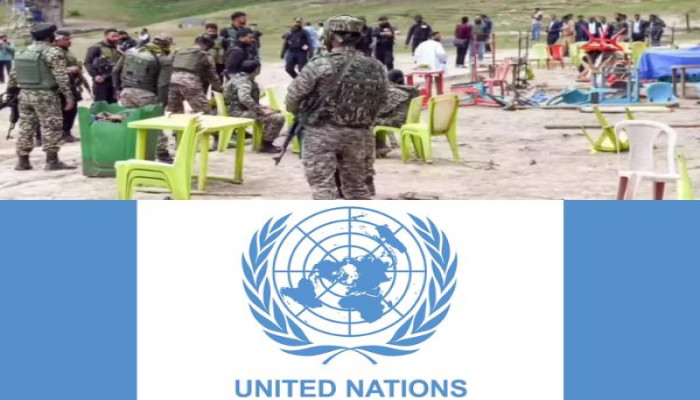UNSC report names Lashkar-backed TRF in Pahalgam attack, marking diplomatic win for India
- In Reports
- 08:02 PM, Jul 30, 2025
- Myind Staff
A report from the United Nations Security Council connected The Resistance Front, a group backed by Pakistan-based Lashkar-e-Taiba, to the Pahalgam terror attack, and this was being considered a diplomatic success for India since it was the first time the group had been named in any UN document.
India had shared details regarding the involvement of TRF and its association with Lashkar-e-Taiba.
When the UN Security Council released a press note three days after the April 22 Pahalgam attack that killed 26 civilians, Pakistan, which was then a non-permanent member of the Council, had stopped any mention of TRF or even Pahalgam from being included, and later, Pakistan’s foreign minister Ishaq Dar confirmed that they had removed any reference to TRF from the statement.
The biannual report prepared by the Security Council’s team that monitors sanctions on al-Qaeda and the Islamic State linked the TRF to the Pahalgam attack and also cautioned that terrorist organisations could take advantage of tensions between India and Pakistan.
"On 22 April, five terrorists attacked a tourist spot in Pahalgam, in Jammu and Kashmir. Twenty-six civilians were killed. The attack was claimed that same day by The Resistance Front (TRF), who in parallel published a photograph of the attack site," the report said.
"The claim of responsibility was repeated the following day. On 26 April, however, TRF retracted its claim. There was no further communication from TRF, and no other group claimed responsibility. Regional relations remain fragile. There is a risk that terrorist groups may exploit these regional tensions," it said.
Without naming specific countries, the report stated that one UN member country believed the attack "could not have happened without Lashkar-e-Tayyiba (LeT) support, and that there was a relationship between LeT and TRF", while another member country had said the "attack was carried out by TRF, which was synonymous with LeT".
According to people aware of the developments who spoke on the condition of anonymity, these two countries were India and the United States, both of which had recently designated TRF as a global terror outfit and as a front for Lashkar-e-Taiba.
In a clear indication towards Pakistan, the report from the UN Security Council stated, "Yet one Member State rejected these views and said that LeT was defunct." Pakistan had consistently claimed that Lashkar-e-Taiba had been dismantled after an official ban was imposed.
Despite this claim, the group had remained operational in various parts of Pakistan, continuing to collect funds and recruit members while maintaining a discreet presence.
The individuals mentioned earlier said the recent UN report was significant because all findings of the 1267 Sanctions Committee, including reports from its monitoring team, are finalised only after consensus among the members of the Security Council. "In other words, Pakistan was unable to prevent a reference to TRF in the report, as they had done in the case of the press statement in April," a person said.
The 1267 Sanctions Committee is responsible for tracking sanctions on al-Qaeda, the Islamic State, and their associated groups. Lashkar-e-Taiba and Jaish-e-Mohammed have been included under this framework due to their historical ties with al-Qaeda since the 1990s.
The people also pointed out that it was important that China, a close ally of Pakistan and a permanent member of the Security Council, had not blocked any mention of TRF or Lashkar-e-Taiba in the UN report. In earlier instances, China had supported Pakistan by using procedural tools like requesting more information to delay or stop the listing of Pakistani terrorists.
In the case of Jaish-e-Mohammed chief Masood Azhar, China had stopped his listing at the Security Council for nearly ten years before finally allowing it in 2019.
"The inclusion of TRF in the UN report has punctured Pakistan’s strategy of plausible deniability by using secular and modern names such as The Resistance Front and People Against Fascist Front for its jihadi proxies. This was done to divert attention from LeT and JeM and give an indigenous guise to its terrorist activities in Jammu and Kashmir," a second person said.
This was also the first instance in many years where Lashkar-e-Taiba and other Pakistan-based terror outfits were named in the report by the monitoring team.
After the Pahalgam attack, a group of Indian officials visited the United States in the middle of May, where they briefed the monitoring team of the 1267 Sanctions Committee and other allied nations on TRF’s activities and shared a detailed dossier on the group.
The team also met with officials from the UN Office of Counter-Terrorism and the Counter-Terrorism Committee Executive Directorate to push for TRF’s listing as a global terrorist organisation by the Security Council.
India had also submitted information regarding TRF’s involvement and its links to Lashkar-e-Taiba in the biannual reports to the monitoring team in May and November 2024. Before this, in December 2023, the Indian side had informed the monitoring team that Lashkar-e-Taiba and Jaish-e-Mohammed were functioning in Jammu and Kashmir through groups like TRF.
On May 7, India carried out military operations under Operation Sindoor targeting terrorist bases located in areas controlled by Pakistan as a response to the Pahalgam attack. This led to four days of heavy exchange of drone attacks, missile launches, and long-range artillery strikes between the two countries until they agreed to stop the military operations on May 10.







Comments